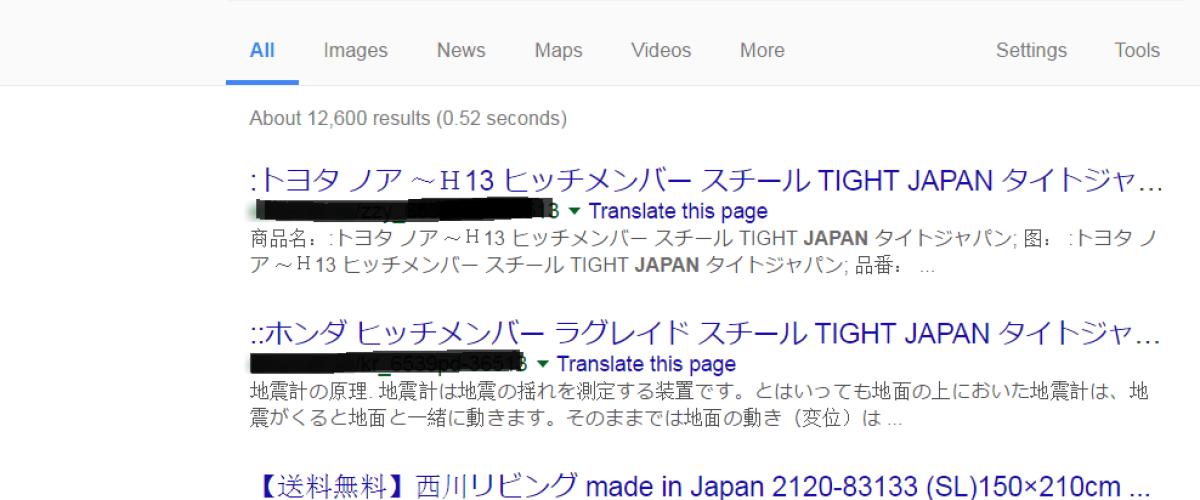WordPress websites are popular targets for hackers due to their widespread use and potential vulnerabilities. Moreover, an emerging issue involves compromised WordPress sites displaying Japanese search results, even if the site’s primary language is different. This phenomenon can be alarming for website owners and can negatively impact their online presence. In this blog post, we will explore the reasons behind WordPress website hacks and the occurrence of Japanese search results. We will also provide actionable tips to safeguard your WordPress site and regain control over search results.
1. Understanding WordPress Website Vulnerabilities-
To comprehend why WordPress sites are often hacked, it’s important to recognize the vulnerabilities they may possess. Common reasons include:
- Outdated Software: Running outdated versions of WordPress core, themes, or plugins can leave your website susceptible to known security vulnerabilities.
- Weak Passwords: Using weak or easily guessable passwords makes it easier for hackers to gain unauthorized access to your website.
- Insecure Plugins and Themes: Installing plugins or themes from untrusted sources can introduce security flaws into your WordPress site.
- Lack of Security Measures: Failing to implement security measures such as SSL certificates, firewalls, or security plugins can leave your website exposed.
2. Japanese Search Results: The Impact
Hackers compromising WordPress websites sometimes alter search results to display Chinese content, even if the site’s primary language is different. This practice aims to manipulate search engine rankings and divert traffic to unrelated or spammy websites. The impact of this can be significant:
- Loss of Organic Traffic: When search results display irrelevant content, it can deter genuine visitors from accessing your website, resulting in a decline in organic traffic.
- Damage to Online Reputation: If users encounter spammy or unrelated content associated with your website, it can harm your online reputation and brand image.
- SEO Consequences: Altered search results can negatively impact your website’s search engine optimization (SEO) efforts, making it harder for your site to rank well for relevant keywords.
3. Preventing WordPress Website Hacks
Safeguarding your WordPress website from potential hacks is crucial to maintain its integrity. Implement the following preventive measures:
- Regular Updates: Keep your WordPress core, themes, and plugins up to date to patch known vulnerabilities.
- Strong Passwords: Use complex, unique passwords and consider implementing two-factor authentication (2FA) for an additional layer of security.
- Trustworthy Themes and Plugins: Only install themes and plugins from reputable sources. Regularly update and remove unused or outdated plugins.
- Security Plugins: Utilize security plugins that offer features like malware scanning, firewall protection, and login attempt limitations.
- Backup Regularly: Create frequent backups of your website files and database to quickly restore your website if it is compromised.
- Secure Hosting: Choose a reliable hosting provider that prioritizes security and offers features such as SSL certificates and server-level security.
4. Removing Japanese Search Results
If your WordPress site has been hacked and is displaying Japanese search results, take immediate action to restore control over your online presence:
- Identify the Hack: Scan your website for malware using security plugins or seek professional assistance to identify the source of the compromise.
- Clean Malware and Restore Backup: Remove any malicious code injected into your website files and database. Restore your website from a clean backup.
- Update Security Measures: Strengthen your website’s security by implementing the preventive measures mentioned earlier, ensuring your site is well protected moving forward.
- Request Reconsideration: If your site has been flagged by search engines, submit a reconsideration request to have the Japanese search results removed from search listings.
5. Monitoring and Maintaining Website Security
Maintaining ongoing website security is essential to prevent future hacks and ensure the integrity of your online presence:
- Regular Scans: Perform regular malware scans and monitor your website for any suspicious activity or unauthorized access.
- Monitor Search Results: Keep an eye on search engine results to detect any unusual search listings associated with your website.
- Web Application Firewall (WAF): Consider implementing a WAF to provide an additional layer of protection against potential attacks.
- Security Audits: Conduct periodic security audits to identify vulnerabilities and address them proactively.
- Educate Users: Train website administrators and users on security best practices, such as recognizing phishing attempts and maintaining secure login credentials.
Protecting your WordPress website from hacking attempts and the resulting Japanese search results is crucial for maintaining a strong online presence. By understanding common vulnerabilities, implementing preventive measures, and promptly addressing any compromises, you can safeguard your website from potential threats. Regular monitoring, ongoing maintenance, and user education are essential components of maintaining a secure WordPress site. By following these practices, you can regain control over your online presence, restore search engine rankings, and ensure a positive experience for your visitors. Remember, proactive security measures and continuous vigilance are key to protecting your WordPress website from future attacks.
FAQ Points to Find & Fix the Japanese Keyword Hack
Q: What is the Japanese keyword hack?
A: The Japanese keyword hack is a type of website hack where unauthorized users inject Japanese keywords and content into a website, often in an attempt to manipulate search engine rankings and redirect traffic to unrelated or spammy websites.
Q: How can I identify if my website has been affected by the Japanese keyword hack?
A: Here are some signs that your website may have been compromised by the Japanese keyword hack:
- Sudden appearance of Japanese characters or keywords on your website.
- Unusual search engine results displaying Japanese content for your website.
- Increased traffic from Japanese IP addresses or an influx of traffic from unknown or suspicious sources.
Q: What steps should I take to fix the Japanese keyword hack?
A: To fix the Japanese keyword hack and regain control over your website, follow these steps:
- Scan your website: Use a reputable security plugin or website scanning tool to identify any malware or malicious code injected into your website files and database.
- Remove malicious code: Carefully analyze your website files and database to locate and remove any injected Japanese keywords or content. Make sure to create a backup of your website before making any changes.
- Update your website software: Ensure that your WordPress core, themes, and plugins are up to date to patch any vulnerabilities that may have been exploited by the hackers.
- Change passwords: Update all passwords associated with your website, including your admin login, FTP, and database access credentials. Use strong, unique passwords to minimize the risk of unauthorized access.
- Harden website security: Implement security measures such as installing a reputable security plugin, enabling a web application firewall (WAF), and regularly monitoring your website for suspicious activity.
- Request a reconsideration from search engines: If your website has been flagged by search engines due to the Japanese keyword hack, submit a reconsideration request to have the warning removed and regain your search engine rankings.
Q: How can I prevent future occurrences of the Japanese keyword hack?
A: To minimize the risk of future Japanese keyword hacks, follow these preventive measures:
- Keep your website software up to date, including WordPress core, themes, and plugins.
- Use strong and unique passwords for all website-related accounts.
- Regularly back up your website files and database, and store the backups securely.
- Use reputable themes and plugins from trusted sources.
- Install a security plugin that offers features like malware scanning, firewall protection, and login attempt limitations.
- Monitor your website regularly for any suspicious activity or unauthorized access.
- Educate yourself and your team about website security best practices.
Q: Should I seek professional help to fix the Japanese keyword hack?
A: If you are unfamiliar with website security or if the hack seems extensive, it is advisable to seek professional assistance. A professional website security expert can help you identify and remove the injected code, assess any vulnerabilities, and provide guidance on strengthening your website’s security.
Remember, taking immediate action and implementing security measures will not only help you remove the Japanese keyword hack but also protect your website from future attacks.
We have professional website security expert team check our Fiverr reviews here- remove any type of malware issues


